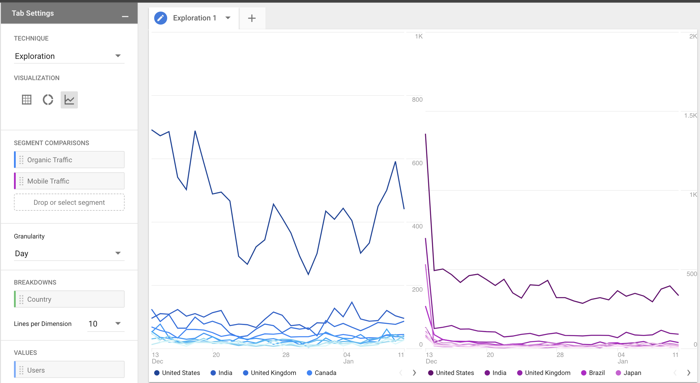In the fast-paced realm of digital marketing and search engine optimization (SEO), staying attuned to the latest advancements is paramount to success. One of the most notable shifts in recent years has been the transition from Universal Analytics to Google Analytics 4 (GA4), signalling a seismic change in the way we measure and analyze website performance. In this blog post, we embark on a journey to explore the transformation of SEO metrics and insights brought about by this transition.

Digital marketers and SEO professionals have long relied on web analytics to make data-driven decisions, fine-tune strategies, and achieve online success. However, the game-changing leap from Universal Analytics to GA4 introduces a new era of analytics, one that places users at the centre of the equation.
Our mission is to delve deep into this transition, shedding light on how the landscape of SEO metrics has evolved with the advent of GA4. Through this comparison, we aim to elucidate the crucial differences, capabilities, and advantages that GA4 brings to the table. Whether you’re a seasoned SEO veteran or just embarking on your digital marketing journey, understanding these changes is paramount in harnessing the full potential of GA4 for your SEO efforts. Join us on this exploration of the next generation of SEO analytics and uncover the future of data-driven digital marketing.
The Importance of Analytics in SEO
Analytics plays an indispensable role in the world of search engine optimization (SEO). It serves as the compass guiding SEO professionals through the vast digital landscape. Here’s why analytics is critically important in shaping SEO strategy:
Data-Driven Decision Making: SEO is not a guessing game; it’s about making informed decisions based on data. Analytics provides the data needed to understand how a website is performing, what’s working, and what needs improvement.
Performance Evaluation: Without analytics, it’s challenging to assess the success of an SEO campaign. Analytics platforms offer insights into key performance indicators (KPIs), allowing SEO professionals to measure progress and adapt strategies accordingly.
User Behaviour Insights: Analytics tools reveal how users interact with a website. Understanding user behaviour—what pages they visit, how long they stay, and what actions they take—empowers SEO experts to optimize the user experience and content. Also, you can integrate WordPress survey plugins into your website to get valuable insights from users, to better understand their preferences and needs.
Keyword Effectiveness: Analytics platforms track which keywords drive traffic and conversions. This information is invaluable for keyword optimization and targeting efforts.
ROI Measurement: SEO efforts cost time and resources, and analytics helps measure the return on investment (ROI). By tracking conversions, lead generation, and revenue generated from organic search, businesses can gauge the value of their SEO efforts.
III. Universal Analytics: The Old Standard
Before the advent of Google Analytics 4 (GA4), Universal Analytics was the trusted go-to for web analytics. Here’s a closer look at Universal Analytics, including its features, common SEO metrics, and limitations:
Overview of Universal Analytics: Universal Analytics was Google’s previous generation of web analytics, focusing on session-based tracking. It provided valuable insights into website traffic, sources, and user demographics.
Common SEO Metrics: Universal Analytics offered metrics like organic traffic, pageviews, bounce rates, and conversion tracking. SEO professionals relied on these metrics to assess the effectiveness of their campaigns.
Limitations: However, Universal Analytics had its limitations. It struggled to capture user behaviour across multiple sessions comprehensively. This session-based approach didn’t always reflect the reality of user journeys, which often spanned multiple visits.
Data Sampling: As websites grew in traffic, Universal Analytics often resorted to data sampling, which meant that reports were based on a subset of data rather than the full dataset. This could lead to less accurate insights, especially for high-traffic websites.
Limited User-Centric Focus: Universal Analytics primarily focused on sessions and pageviews rather than individual users. This limitation hindered a holistic understanding of user behaviour and hindered the ability to track users across devices and platforms.
- Google Analytics 4 (GA4): The Next Generation
Introducing GA4’s User-Centric Approach: GA4 represents a significant departure from Universal Analytics by adopting a user-centric approach. Rather than focusing solely on sessions and pageviews, GA4 is designed to follow individual users across their journeys on a website. This shift provides a more comprehensive and accurate view of user behaviour.
Key Differentiators: GA4 introduces several key features that set it apart from its predecessor. These include event-based tracking, predictive metrics, cross-platform and cross-device capabilities, and more. We’ll explore each of these features in-depth to showcase how they revolutionise SEO analytics.
Conversion Tracking: Set up conversion goals in GA4 to track specific actions related to Yahoo SEO, such as form submissions or product purchases from visitors coming from Yahoo search. This allows you to measure the ROI of your SEO efforts.
Benefits for SEO Insights: With its user-centric model and advanced features, GA4 offers numerous advantages for SEO professionals. From gaining deeper insights into user behaviour to improving user experience and optimising content strategy, GA4 empowers SEO experts to make data-driven decisions and achieve better results.
- Evolving SEO Metrics with GA4
Now, let’s delve into how GA4’s unique features enhance SEO metrics and insights:
Event-Based Tracking: GA4’s event-based tracking allows you to monitor specific user interactions, such as clicks on CTAs, video views, and form submissions. This granular data enables SEO professionals to identify which on-page elements are driving user engagement and conversions, leading to more targeted optimization efforts.
Comprehensive User Journey Analysis: Unlike the session-based approach of Universal Analytics, GA4 provides a holistic view of user journeys. It tracks users across multiple sessions, enabling you to understand the complete path users take before conversion. This in-depth user journey analysis helps refine your SEO strategy to better align with user expectations.
Custom User Segments: GA4’s ability to create custom user segments based on demographics, behaviour, and acquisition source is a game-changer for SEO. You can tailor your SEO efforts to different audience segments, ensuring that your content and optimization strategies are more relevant and effective.
- Event Tracking and SEO Insights
Event tracking is a pivotal component of GA4 that warrants a closer look. In this section, we’ll explore the concept of event tracking in detail and shed light on its crucial role in providing SEO insights:
Understanding Event Tracking: Event tracking in GA4 involves monitoring specific user interactions or events on your website. These events can encompass a wide range of actions, such as clicks on buttons, downloads, video views, and more. It allows you to capture and analyze user engagement beyond traditional pageviews.
Examples of SEO Insights: Event tracking in GA4 opens the door to a treasure trove of SEO insights. For instance, by tracking clicks on important call-to-action buttons, you can determine which elements are most effective in driving user engagement and conversions. Similarly, monitoring video views can help identify popular content and guide your video SEO strategy.
Comparison with Universal Analytics: Contrasting these insights with what was possible in Universal Analytics reveals the magnitude of the improvement. Universal Analytics primarily focused on pageviews and sessions, which provided limited visibility into user interactions. GA4’s event tracking goes a step further, offering a more nuanced understanding of user behaviour and allowing for highly targeted SEO optimization.
VII. Predictive Metrics and Cross-Platform Tracking
Moving beyond event tracking, GA4 introduces predictive metrics and robust cross-platform tracking, both of which have profound implications for SEO:
Predictive Metrics: GA4 incorporates machine learning to provide predictive metrics, such as potential revenue and churn probability. These metrics empower SEO professionals to identify high-value users and prioritize optimization efforts for maximum impact. It’s a shift from retrospective analysis to proactive decision-making.
Cross-Platform and Cross-Device Tracking: In an era where users seamlessly switch between devices and platforms, GA4 ensures a cohesive tracking experience. It allows you to follow users across different devices and platforms, providing a comprehensive view of their interactions with your website. This cross-platform tracking is invaluable for optimising user experiences and SEO strategies across all touchpoints.
As GA4 continues to redefine the landscape of SEO analytics, these advanced features are reshaping how SEO professionals gather data, make informed decisions, and adapt to the ever-evolving digital ecosystem. Embracing predictive metrics and mastering cross-platform tracking are essential steps for staying ahead in the competitive world of SEO.
- Adapting to the Changing Landscape
Adapting to the shift from Universal Analytics to GA4 is crucial for SEO professionals to stay ahead of the curve. Here’s guidance on how to navigate this changing landscape:
Familiarise Yourself with GA4: Start by thoroughly familiarising yourself with the features and capabilities of GA4. Invest time in learning the new interface, reports, and terminology to make the transition smoother.
Update Tracking Codes: Ensure that you’ve updated your website’s tracking code to the GA4 version. This is a fundamental step in ensuring that GA4 collects the data you need for SEO analysis.
Define Goals and Events: Clearly define your SEO goals and the specific events you want to track in GA4. This ensures that you’re capturing the right data to measure the success of your SEO strategy.
Customise Reports: Take advantage of GA4’s customization options to create reports tailored to your SEO needs. Customise dashboards and segments to focus on the metrics that matter most to your strategy.
Stay Informed: GA4 is continuously evolving. Stay updated with the latest features and updates from Google. Join online communities and forums to learn from others’ experiences and stay informed about best practices.
Conclusion
In conclusion, the transition from Universal Analytics to GA4 represents a significant shift in the world of SEO analytics. The user-centric approach, event tracking, predictive metrics, and cross-platform capabilities of GA4 have revolutionised how SEO professionals gather and interpret data.




